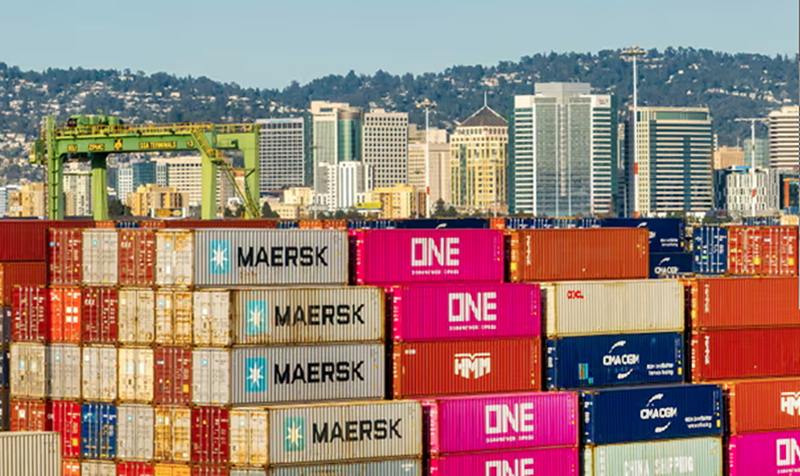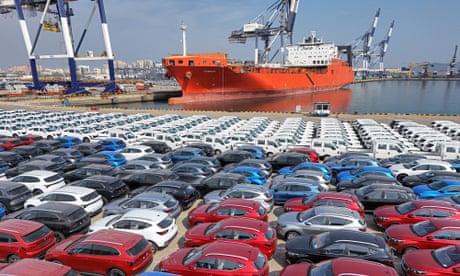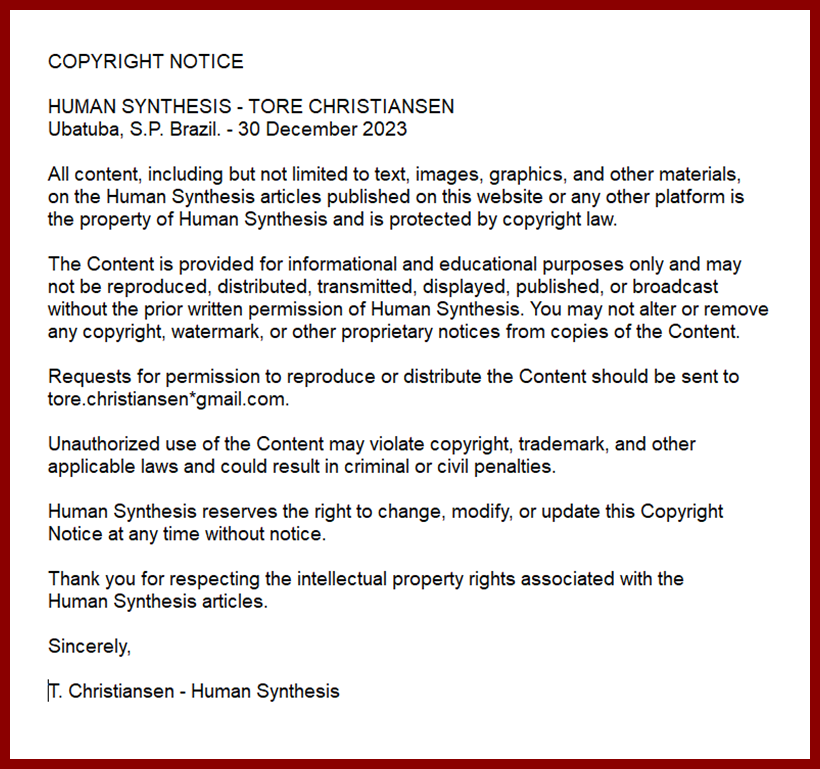Trump tariffs come into effect in ‘seismic’ shift to global trade

By Guardian-Aneesa Ahmed-Sat 5 Apr 2025 11.05 BST
‘Baseline’ 10% import levy takes effect at US seaports, airports and customs warehouses on Saturday, with some higher tariffs to begin next week. Donald Trump’s 10% tariff on all imports from many countries, including the UK, has come into force after 48 hours of turmoil.
US customs agents began collecting the unilateral tariff at US seaports, airports and customs warehouses at 12.01am ET (04:01 GMT), with higher levies on goods from 57 larger trading partners due to start next week – including from the EU, which will be hit with a 20% rate.
Keir Starmer was expected to spend the weekend speaking to foreign leaders about the tariffs, after calls with the Australian prime minister, Anthony Albanese, and the Italian PM, Giorgia Meloni, on Friday in which the leaders agreed that an “all-out trade war would be extremely damaging”.
Starmer was “clear the UK’s response will be guided by the national interest” and officials would “calmly continue with our preparatory work, rather than rush to retaliate”, a No 10 spokesperson said.

Up until now, UK ministers have avoided voicing any criticism of Trump as they sought to secure a trade agreement with the US – hoping for some exemption from the tariffs. However, the UK government has drawn up a list of products that could be hit in retaliation, and was consulting with businesses on how any countermeasures could affect them.
Ralph Goodale, the high commissioner for Canada in the UK, told BBC’s Radio 4 Today programme that the US needed to “feel the pain” and Canada would stand firm.
He said: “The action taken by the US government is completely illogical. It will damage the United States itself. It will raise costs in the United States. It will eliminate jobs in the United States, it will reduce growth in the United States and we have to make it abundantly clear not just that that is going to happen rhetorically, but the US has to feel the pain, because ultimately it will be Americans who will persuade their government to stop this foolishness.”
Trump’s announcement of the tariffs on Wednesday shook global stock markets to their core, wiping out $5tn in stock market value for S&P 500 companies by Friday’s close, a record two-day decline. The prices of oil and commodities plunged, as investors fled to the safety of government bonds.
“This is the single biggest trade action of our lifetime,” said Kelly Ann Shaw, a trade lawyer at Hogan Lovells and former White House trade adviser during Trump’s first term.
‘In economic terms, Trump’s tariffs make no sense at all’.
While speaking at a Brookings Institution event on Thursday, Shaw said she expected that over time the tariffs would evolve as countries started negotiating lower rates for themselves, but she called the change “huge”.
Shaw said: “This is a pretty seismic and significant shift in the way that we trade with every country on Earth.”
Australia, the UK, Colombia, Argentina, Egypt and Saudi Arabia are among countries initially hit with the 10% tariff.
At 12.01 ET on Wednesday, Trump’s higher “reciprocal” tariff rates of 11% to 50% are due to take effect. EU imports will face a 20% tariff, while Chinese goods will be hit with a 34% tariff, bringing Trump’s total new levies on China to 54%.
Canada and Mexico were exempt from Trump’s latest duties because they are still subject to a 25% tariff related to the US fentanyl crisis for goods that do not comply with the US-Mexico-Canada rules of origin.
Reuters contributed to this report
There is a lot at stake
The world’s most powerful man is using his office to punish journalistic organisations that won’t follow his orders or who report critically on his policies. Donald Trump’s actions against the press include bans, lawsuits and hand-picking his own pool of reporters.
But the global threat against the press is bigger than just Trump.
Economic and authoritarian forces around the globe are challenging journalists’ ability to report. An independent press, one that those in power can’t simply overrule, is crucial to democracy. Figures such as Trump and Hungary’s Viktor Orbán want to crush it through exclusion and influence.
The Guardian is a global news organisation that will stand up to attacks on the free press. We have no interest serving those with immense power or immense wealth.
We are owned by an independent trust devoted only to protecting and defending our journalism. That means we don’t have a billionaire owner dictating what our reporters can cover or what opinions our columnists can have, or shareholders demanding a quick return.
The global situation is shifting hour by hour, making this an extremely challenging moment. It will take brave, well-funded, committed, quality journalism to call out what is happening.
Our job is to make sure we do not get overwhelmed as Trump floods the zone. We must focus on the stories that will make the biggest impact on people’s lives, while holding the powerful to account. We’ll also continue to focus on the ideas people need to create a better world: a reason for hope.
As the writer and Guardian columnist Rebecca Solnit says: “authentic hope requires clarity … and imagination”.
The Guardian can provide both and, with the help of readers like you in Brazil, we can drive hope by reporting truthfully on what is happening and never pulling our punches.
A lot is at stake. - Support $3/month?
We value whatever you can spare, but choosing an All-access digital subscription makes the most impact, enabling greater investment in our most crucial, fearless journalism. In return, we can offer you some great benefits. We’ve made it quick and easy to set up, so we hope you’ll consider it. Thank you.

Katharine Viner
Editor-in-chief, the Guardian
